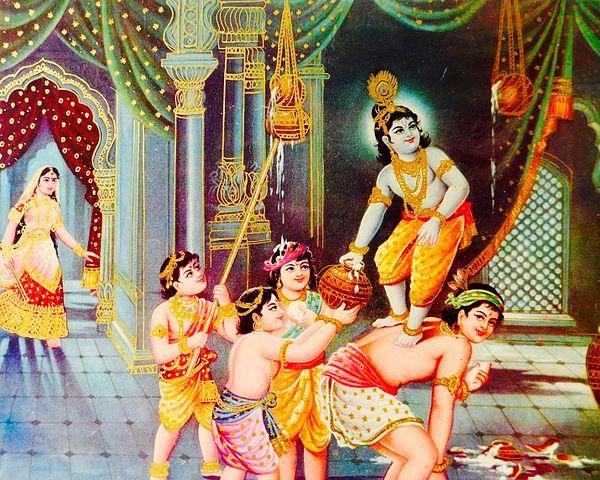By: Rasamandala Das (ISKCON).
The aim of Hindu Scriptures is to gradually elevate man from a state of ignorance (tamas) to a state of pure goodness (çuddha-sattva). Ignorance is opposed to goodness. In ignorance, affected by material desires, anger, hate and greed, one becomes illusioned. An illusioned man cannot understand what is what. Instead of advancing in spiritual knowledge, one becomes more and more degraded. In ignorance, man does not possess perfect wisdom nor does he know what real enjoyment is, nor does he know how to act. Bewildered by his passions, man strives for pleasure that results in suffering. Only in goodness,can one see things as they are for one’s true benefit.
Hindu Scriptures are called the Vedas (from the Sanskrit root vid: to know oneself and God) and are also called Sanätana Dharma, man’s eternal occupation. The foundation of all Hindu Scriptures is based on the teaching of the Bhagavad-gétä, which is sometimes called the “Hindu Bible”. Throughout the Ages, the Bhagavad-gétä has been studied by great men because it gives powerful statements about the meaning of life.
The Bhagavad-gétä is an ancient Sanskrit philosophical poem that describes how to attain serenity, detachment, personal devotion to God and work done without concern for results but with the pure intention of fulfilling the will of God.The Sanskrit name for God in the Bhagavad-gétä is Krishna, which means the All-attractive Personality of Godhead. In the Bhagavad-gétä, one will find explanations and answers to any questions. Bhagavad-gétä is also known as Gétopaniñad. It is the essence of Vedic knowledge and is one of the most important Upaniñads in Vedic literature.The purpose of Bhagavad-gétä is to deliver man from material struggle.
In daily life, man encounters many difficulties and anxieties. Such perplexities can be overcome by inquiring about who am I ? Where do I come form? Who is the Supreme? In the Bhagavad-gétä,the subject of these inquiries entails five basic truths. What God is (éçvara)? What the living entityis (jéva)? What material nature is (prakåti)? What is time ( käla)?And what the activities (karma) of the living entities are? These five basic truths are: éçvara (God), jéva(living entity), prakåti (material nature), käla (time), and karma (activities).

God (éçvara) is supreme since He controls the living entities (jévas), material nature (prakåti), time (käla) and activities (karma). The Supreme Lord is supreme since He is supremely conscious. The livings entities are also conscious while material nature (prakåti) is unconscious, dull. The supremely conscious Godhead controls material nature since the later is not conscious. Though the living being is also conscious, but he is conscious only of the pain and joy of his particular body, whereas the Lord is conscious of all bodies. Because the Personality of Godhead lives in the heart of every living being, He is conscious of the psychic movements of the particular living entity.
The living entities are parts and parcels of the Lord just as a particle of gold is also gold, a drop of water from the ocean is also salty. and similarly we, the living entities, being part and parcel of the supreme Lord have all the qualities of the Supreme Lord in minute quantity.Man and God are differentiated from each other by having contrary attributes. God is almighty, man has a limited capacity; God is all-pervading, man is atomic; God is the controller, man is controlled.
Since material nature (prakåti) is unconscious, consciousness is not generated by the association of matter.Consciousness is eternally existing. Material nature, which is constituted by three qualities, namely the mode of goodness, passion and ignorance, covers the living entity’s consciousness. Thus, the conditioning and the distress of the living entity is due to these three qualities of ignorance, passion and goodness. As result, the living entity’s consciousness is contaminated by these three modes. False consciousness is exhibited under the impression that everything is a product of material nature. The purpose of the Bhagavad-gétä is to teach man how to attain a pure consciousness by transcending the three modes of material nature.
Material nature is controlled by time as well as by the Supreme Lord. The function of time is to change everything. Time acts as the destroyer of material nature. So, time is above material nature (prakåti) and above time is God since God is the controller of time. Time is an inconceivable energy of the Supreme Lord through which He ultimately destroys everything. In this material world, whether is it the material body, a building or a piece of fruit, everything which comes into being has to vanish.
Time brings birth, old age, disease and death. Man can surpass the severe influence of time by using his time in serving and remembering the Supreme Personality of Godhead. Such time is not lost since such spiritual activities are valuable assets meant to elevate the consciousness of man in this and the next life. Material nature (prakåti) is also controlled by the Supreme Lord. For instance, a child may think that an automobile can run without a driver. But a sane man knows that the movement of the car is due to a driver. Similarly, the Supreme Lord is the driver under whose direction everything works.
The fifth basic truth is karma (activity). Out of these five, the Lord, the living entities, material nature and time are eternal while karma is not eternal. What is karma? Some activities are performed under the influence of the mode of ignorance, others are tainted by the mode of passion and others by the modes of goodness. Man suffersthe result of thoseactivities that are performed under the mode of ignorance and passion and enjoys the result of those activities which are performed under the mode of goodness. Thus, activities depend on the three modes of material nature. By a combination of the modes of ignorance, passion and goodness and under the control and purview of time, there are activities (karma). The result enjoyed or suffered is called karma.
At present, man may be suffering or enjoying the results of his karma (activity). But he can change the results of his karma. Such change depends on transcendental knowledge. To gain relief from the actions and reactions of all these activities, man has to develop the knowledge of how to perform activities that are above the mode of ignorance and passion. The aim of Vedic Scriptures is to gradually teach man how to perform activities that are on the level of pure goodness (çuddha-sattva). This can take place only for a person who has developed spiritual knowledge. Thus to be a free man or to be free from the entanglement of these three modes, one has to first learn these five basic truths which are: éçvara (God), jéva (living entity), prakåti (material nature), käla (time), and karma (activities).

